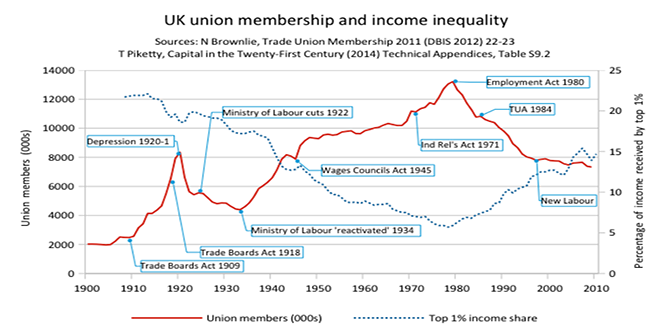 Many debates about welfare policy rest on implicit or explicit claims about the social ramifications of welfare spending. Matthew Donoghue suggests that community cohesion is a crucial issue to be considered as part of such debates. He argues that individual autonomy, ensured by a minimum standard of living, stands as a necessary condition for community cohesion.
Many debates about welfare policy rest on implicit or explicit claims about the social ramifications of welfare spending. Matthew Donoghue suggests that community cohesion is a crucial issue to be considered as part of such debates. He argues that individual autonomy, ensured by a minimum standard of living, stands as a necessary condition for community cohesion.
Throughout my current research I have been astounded that there seems to be so little work that specifically combines discussions surrounding welfare with those surrounding cohesion. It seems to me that true welfare should have cohesive effects, and a good cohesion framework will provide some form of welfare. Of course, ‘cohesion’ can be taken as multifaceted; a vessel that can contain whatever those using the term wish it to. Case in point is the UK’s community cohesion policy framework, which legislates for a specific set of race relations rather than addressing the more traditional socio-economic areas of cohesion. My main contention here is that if states desire increased cohesion within societies and polities, citizens require a certain standard of living across the board. In other words, to increase participation, bolster community spirit, and improve happiness (something that used to be high on David Cameron’s agenda), all citizens should be able to attain a minimum level of socio-economic autonomy.
To achieve this, the welfare state (including, but also beyond, benefits) should be developed in a way as to foster such autonomy. Of course, New Labour and the current coalition government will argue that this is exactly what their respective welfare programmes were designed to do, and will point to various figures concerning getting those who want to work (and who of course should work) back in to the labour market. Yet we already know that the statistics used to prove such points can be unreliable. Beyond this, I contend that the method used to reinsert people back in to the labour market can be damaging to cohesion. In an article published in British Politics, I provide extracts from various DWP and DCLG policy and consultation documents that illustrate the previous government’s ethos toward cohesion (of which I argue welfare is a significant component): that the real killer is social exclusion, and the best way to resolve this problem is to get people in to work as fast as possible. Alongside this the welfare system is designed to be seen as purgatory rather than respite; the stigma attached to welfare benefits actively discourages some from claiming and demonises those who do claim (for an example in popular culture see Owen Jones’ book ‘Chavs: the demonization of the working class’).
But what does this have to do with cohesion, and why should cohesion be studied in relation with welfare? Let’s assume that the role of the welfare state is to provide support to vulnerable people, in order for them to access their social citizenship rights (rights that provide more social autonomy and that are preceded by political citizenship rights in T.H. Marshall’s conception). Let’s then assume that the role of cohesion in a developed state is to unify disparate social elements in to a working whole. Combined, these two institutions would directly influence the quality of citizenship in a given state: i.e. how (pro)active citizens are, the distinction between public and private spheres and the relative influence of economic status. Currently, cohesion in the UK is predicated upon a communitarian/republican ideal of active citizenship toward both the nation and smaller communities. As the Third Way adage goes: no rights without responsibilities. The problem with this, I state both in the British Politics piece and in a second article currently under review, is that this configuration produces a top down system that does not increase the autonomy of the vulnerable. For example, the swathe of conditions placed on receiving benefit can be seen as somewhat similar (albeit more vaguely) to the number of conditions placed upon vulnerable citizens such as migrants: to be accepted as part of the community (national, local or otherwise), one must make an effort to fit in and to ‘integrate’ to make the most out of the socio-political and economic conditions.
The community cohesion framework in the UK specifies ‘communities’ (mainly to mean ethnic groups according to Claire Worley), and states that if these communities are ‘problem communities’ (such as Muslim communities, or south Asian communities), they must make an effort to integrate. What is not discussed is the silent economic aspect. Policy is set up in such a way that allows for other ‘problem’ groups (such as the ‘undeserving poor’) to be targeted just as easily as ethnic groups, and for these groups to be presented as a threat to the cohesion of the nation, because they allegedly wilfully segregate themselves. Therefore it makes sense for welfare and cohesion frameworks to operate in tandem. In the UK this can be seen through the use of social capital, used as a concept and as a measure of how well placed individuals are to participate in society (incidentally, this is the area of academic study that has the most work relevant to a combined study of welfare and cohesion. Yet it is not a specific study of the two).
With such implicit and explicit connections between welfare and cohesion, a fruitful route to develop academic study on welfare could be an in-depth study of its cohesive effects, particularly with regards to policy. There is plenty of work on elements of welfare, cohesion and citizenship that could be combined for example, but less on explicit studies of how welfare and cohesion relate to and influence one another and how these relations and social effects influence citizenship as a whole. If developing a cohesive society is considered an important goal, the effects welfare provision has on cohesion via altering people’s attitudes and behaviour should be acknowledged. Likewise, if a reduced benefit welfare system, which operates on designating people as deserving and undeserving (with the potential stigma that comes with such designations) is the most efficient method, it would certainly be useful to investigate the possible effects that a solid cohesion policy could have on lessening the difference felt (artificial or otherwise) between people on either side of the welfare divide.
Welfare and cohesion, both as policy areas and processes, have multiple commonalities, and these inevitably affect how they work. It seems only right, in that case, that more attention is given to these commonalities in academic research.
Note: This article gives the views of the author, and not the position of the British Politics and Policy blog, nor of the London School of Economics. Please read our comments policy before posting.
Matthew Donoghue is a PhD candidate in Politics at Oxford Brookes University. His thesis is entitled ‘Cohesion’ in the context of Welfare and Citizenship: Science, Policy, Common Sense. His latest article, Welfare and Cohesion Contested: A Critical Discourse Analysis of New Labour’s Reform Programme, is out in British Politics. You can follow him on Twitter and academia.edu.







1 Comments